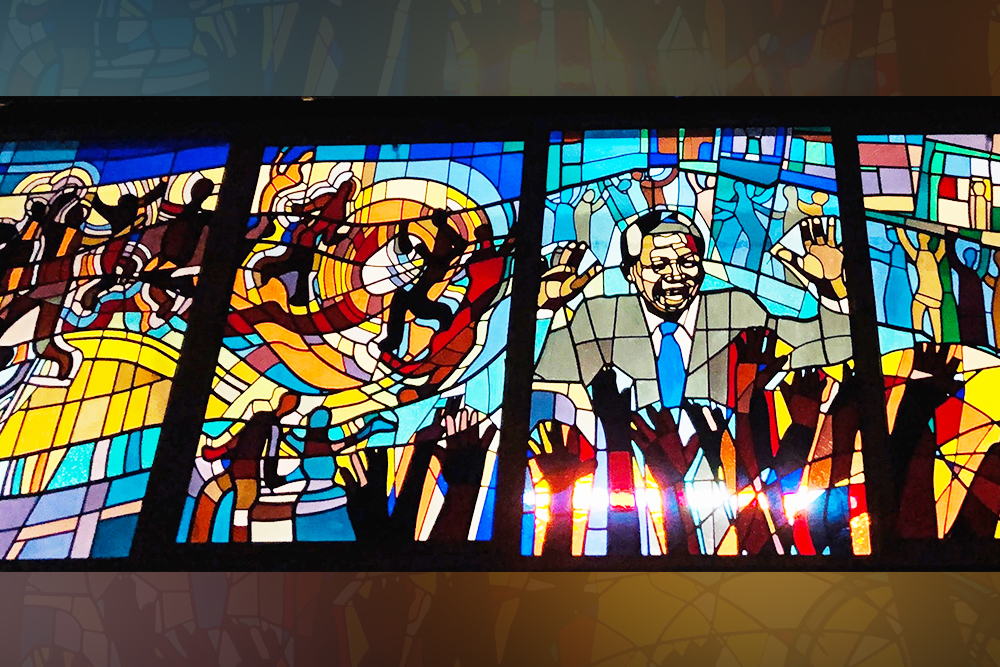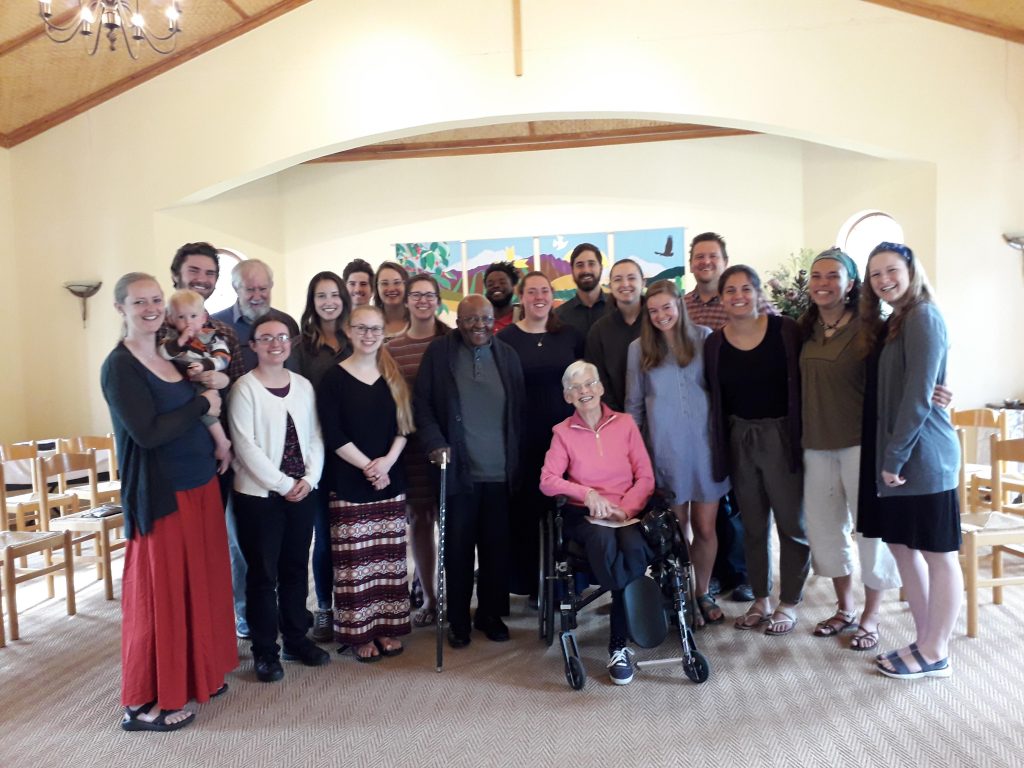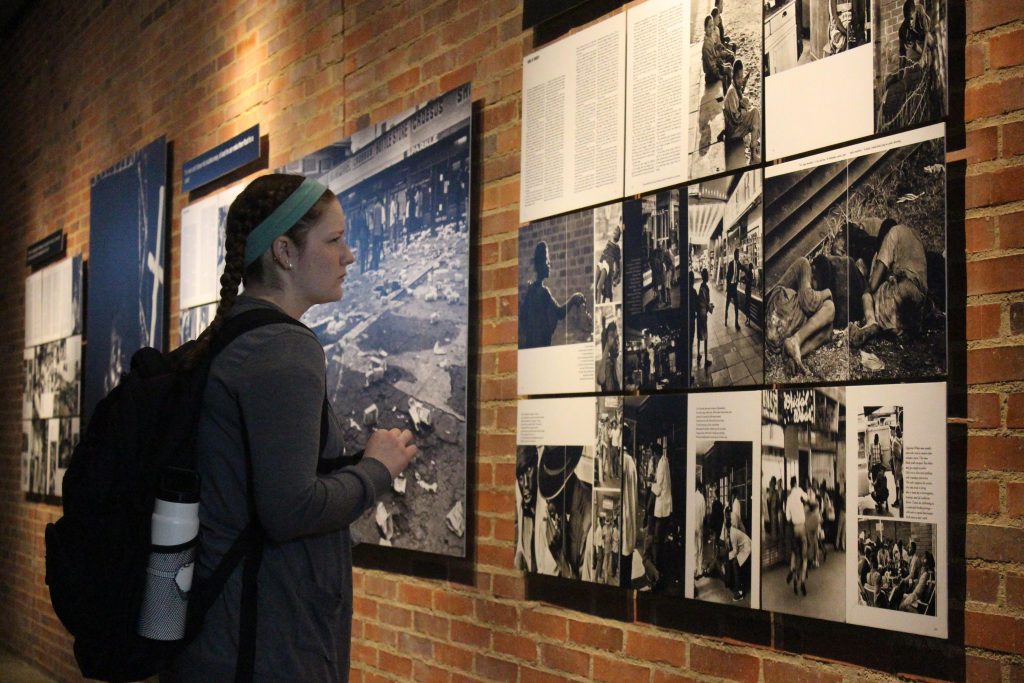EMU students scattered across the globe on summer cross-culturals to Mexico, Puerto Rico, Washington D.C. and South Africa. The cross-cultural experience has been a key component of EMU’s core curriculum for more than 30 years.
Read more news coverage of 2019 summer cross-culturals.
Here’s a post from students serving as the week’s “communications team” during the South Africa crosscultural, led by Andrew and Karen Suderman. Andrew is professor of theology and Karen director of EMU’s Intensive English Program.
From 2009–16, the Sudermans served as Mennonite Church Canada Witness Workers in South Africa. They lived in Pietermaritzburg, South Africa and helped to coordinate the Anabaptist Network in South Africa (ANiSA).

The crosscultural focused on the country’s legacy of colonialism and apartheid and the church’s role in the pursuit of peace, justice, and reconciliation, with visits to Johannesburg, Soweto, Pretoria, Cape Town, Pietermaritzburg and Nelspruit.
In excerpts from the original blog post, the group named high points of “growing together as a group and being unified through experiences and desire for change and justice, laughter and conversation around meals, and feeling alive and grateful to be in South Africa.”
Among the group’s shared learnings:
- Apartheid is still a reality
- How we can learn about the history of our hometowns?
- Realizing passions and what makes me feel angry
- Hospitality is beautiful
- Seeing similarities between South Africa and USA
- The reality of relocation as breaking apart communities
- Taking a risk to talk to people is rewarding
- Do not sit comfortably in the status quo
- We need to trust in God and encourage others to do the same.

From Capetown…
After three long days in the bus, including a 2.5 hour-long delay due to engine issues, we rolled into Capetown. As an exhausted and grateful bunch, we unpacked the bus, dragging our suitcases up three flights of stairs to our new home for the next 10 days. Many of us feel refreshed with the beach view from the back deck – a nice place to escape when we get tired of being in the same room (all 11 young women are sleeping in one room, and the 4 young men are in another). We share a common space and kitchen with other travelers and surfers from around the world.

In Capetown and with day trips to surrounding areas, we are learning about the colonial history of South Africa. Capetown is home to the first settlement of Dutch settlers. We visited places like the Castle of Good Hope and Company Gardens to get a taste of the history of the first settlers. We also visited places like Robben Island to continue learning about the Apartheid era. While driving to and from these places, we continue to observe obvious racial and economic disparities between neighboring areas based on housing, employment, and population density. For release and recreation to take a break from the heavy stories of harm, many of us participated in hiking, surfing, swimming, and napping.
Below, several of us have answered a question reflecting on a meaningful experiences we had in the past week.
How have you seen God?
- In the people hosting and feeding us
- How we have come together as a group like a family
- The Suderman kids – embodying love and joy through laughter, hugs, dancing, ukulele playing, surfing, and so much more
- In the resistance groups we have learned about such as Fees Must Fall and Reclaim the City
- Being challenged in our comfort
- Hearing repeatedly the phrase, there is only one race, “the human race”
- In the beauty of nature —Group responses
Reflect on your experience at Robben Island.
Robben Island was and still is a pivotal part of South Africa’s history. The prison housed regular criminals but mainly housed political activists who spoke against the South African Government. One prisoner by the name of Robert Sobukwe was kept in his own personal cell away from all the other prisoners because his ideology was highly feared. Robben Island was supposed to be a symbol of justice and peace but became the total opposite. My experience at Robben Island was not great. The Island brought up feelings of hate and fear. I constantly thought if I was alive at that time, I would most likely be a prisoner of this island. To me the Island still carries the same energy of hate and violence but at the same time is still building toward peace and reconciliation by offering a truthful story of what happened on the Island. — JD
How have you experienced the change in food? What has been your favorite meal so far?
The food here is amazing. Almost everything we have tried, we have enjoyed. The food can be spicier than what we are used to, such as the chakalaka, which is a yummy side consisting of vegetables and beans. Another food that is a staple here are pap, a corn based starch that is eaten at almost every meal. Some of my favorite foods here have been the braai (meat cookout), cake with custard, actually anything with custard and amagwena (fat cakes). —Olyvia
What were some of your thoughts and reflections as you hiked Cape of Good Hope and Cape Point?
Cape of Good Hope and Cape Point was an amazing experience. If you want to truly experience the beauty and awe inspiring creation of God, visit Cape Point. Every new ridge you could see over gave you a whole new view. It felt like such a huge space, but at the same time we were at a very small point in South Africa. This really was one of the most beautiful places I have ever been and I wish I was able to show everyone it’s true beauty. — Aaron
Walking on to Boulder Beach reminded me of the Oregon coast but with warmer weather and penguins around each boulder. It was a great place to sit, relax, swim or explore and it provided a much needed rest after hiking for a majority of the morning. After hanging out at the beach for an hour or so, we walked on the boardwalk leading to gift stores, ice cream shops and street artist performers. — Lukas
How has your view on community struggle changed since hiking Table Mountain?
Since hiking Table Mountain, community struggle has taken on a new image in my eyes. As we hiked, we encouraged, uplifted, and struggled with one another. We went up in three different groups, but all came to the realization that the hike would not have been possible without our community and sense of a mutual goal. This image has been illuminated countless times not only through the struggle of the hike, but has also taken place throughout every community we have learned about and/or experienced. Community is more than just a place; community is a people in unity as one working towards Ubuntu (“I am because we are.”Another way to say it is “A person is a person only through other people”). This concept has brought to light the fact that we are all one and that no matter the circumstances or struggles, we need each other. —Alyssa
Compare and contrast your experience at Stellenbosch Motherchurch (Dutch Reformed) and Grace Community Church.
Grace Community Church located in Colesberg is a passionate and lively black township church. Stellenbosch on the other hand is a Dutch Reformed in a former whites only town with European undertones. The similarity between these two churches is that they worship the same God and despite the vast differences, the spirit was able to move in both places.
On Sunday, May 19, we attended Grace Community Church. Immediately upon arrival we were greeted with smiles, hugs, and numerous welcomes. The building was one large room constructed with corrugated metal panels. The building was plain and simple but filled with loud, exuberant worship. During the service we were welcomed numerous times, danced, and were even invited to talk while Andrew was asked to give the sermon.
The next Sunday, we attended The Dutch Reformed Church. Stellenbosch was familiar even with the language barrier of Afrikaans. The building was conventional like what you would see in Europe. We sat in a pew, attentive to what the pastor had to say that day, sang songs with all of the same tunes that are found in the Mennonite Hymnal and yet there was still an eerie presence of discomfort. Apartheid history still looms over Stellenbosch as the theology and leaders of apartheid come out of the university and church there challenging my view of comfort.
A quote that has stuck with me throughout my time states, “We used to have the land and they had the Bibles. Now we have the Bibles and they have the land.” I find that this quote gets at the root of the differences between services. —Holly
The original post was curated by Lydia, Alyssa, and JD.
